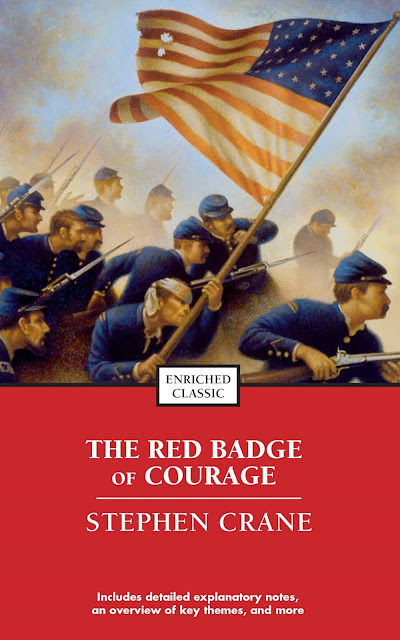It's hard to believe it's gone, but I'll bet it is. For generations, American high school students read Stephen Crane' Red Badge of Courage, a true Civil War novel that wasn't "true" in any way. One of the onerous tasks of teaching the novel was having to admit, at one time or another, that Stephen Crane was a kid when he wrote it (24 years old) and that, if you do the math, there's no way he ever fought in the American Civil War. In fact, he never spent an hour in battle.
He made up the whole story. He may well have read accounts of a battle, but Stephen Crane imagined himself carrying the flag of the United States of America into battle. Can't help feeling a little cheated about that.
But, like it or not, The Red Badge of Courage was, for decades (it was published in 1895), the Civil War novel, and, truth be told, I'm willing to bet that it was read that way, as a kind of historical record, more than it was for its epoch-making "worldview," a vision of life that required some smarts both to teach and to understand.
What it offered, lots of English teachers celebrated (as did I), was something called "literary naturalism," baggage that was heavier than simply literary. It was a "world view," a way of looking at reality, its own pair of spectacles. The Red Badge of Courage featured a kid (Crane was just 24 when he wrote it) who ran from the battlefield and suffers for it, although he suffers far more internally than he does from some officer's reprimand or military imprisonment.
The great story is the not the story of the war, but the story of the disillusion he suffers, not because of war but because he has, seemingly, failed. In RBC, Crane takes a kind of morbid delight in the kid's psychic misery and asks us all to do the same. All of which means that America's greatest Civil War novel isn't about the Civil War at all--it's about how our minds and hearts function. It's about us--Crane's view of us.
But, who cares? RBC is long-gone from American high school classrooms, I'm sure, just as The Merchant of Venice is long gone from required reading for high school sophomores, and I'll bet even in Minnesota kids don't read Sinclair Lewis. Today, it's hard to believe that what we used to call "the canon" is pretty much non-existent.
In college American lit classes, any study of Stephen Crane would likely expand to include "The Open Boat," a wild tale about a storm at sea, and, if a student really wanted to wade into literary naturalism, Maggie: A Girl of the Streets, a little novel that feels like more of a character-study than a finished imaginative work. Maggie never works its way in your heart. You read it and weep. Maggie's sad fortunes bring her down to the shady side of town, and won't allow her escape.
Such is life, Crane says.
When I was in college and beginning to imagine a life as a high school English teacher, Stephen Crane was something of hero. After all, as an author he was just a kid himself--and he loved baseball. What's not to like?
Read a review of a new biography of Stephen Crane this morning, a bio that the reviewer says includes more pages than the whole collected works of the man whose work he's studying.
For years I taught Early American Literature, Am lit up to the Civil War, so Stephen Crane was not part of the curriculum for which I was responsible. It's been years since I read Maggie, even RBC. Truth be told, I hadn't thought much about Stephen Crane himself, an old hero, oddly enough, until this morning when I read the review.
It's odd to remember how much I admired him, once upon a time long ago, but I didn't have to refresh my memory. It's all there yet in my head, even though his peculiar world view is not in my heart.
It's like wading through old photographs and suddenly coming upon one that instantly flashes memories you don't remember you had. A lifetime ago, Stephen Crane, even his life, offered me a path through life.
Even though I was really never a disciple, I'm glad that sometime, years ago, I met him through his work and came away blessed--yes, blessed.
Today, I wish the same for my grandchildren. Red Badge of Courage isn't required reading, but I want them to have the kind of education that dutifully and artfully explores what's really in the human mind and soul.
I want their required reading to be just as important.

No comments:
Post a Comment